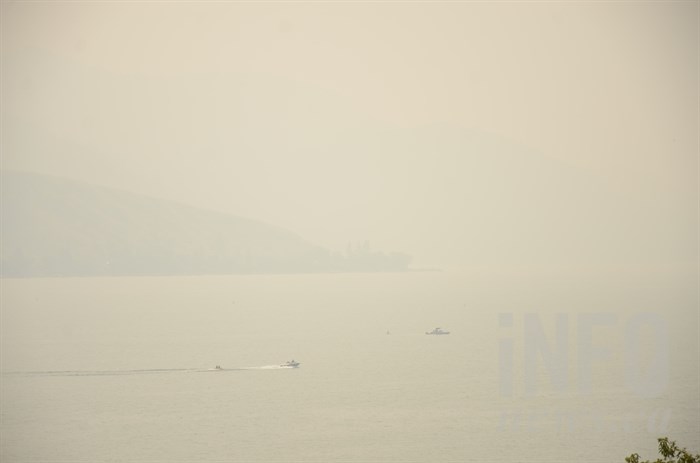
The poor air quality didn't stop boats heading out on Okanagan Lake, Wednesday, Aug. 15, 2018.
(BEN BULMER / iNFOnews.ca)
August 15, 2018 - 2:30 PM
It may look bad, and there can be health concerns, but according to the B.C. Ministry of Environment the smoke blanketing the Southern Interior cannot be compared to the smog that famously covers Beijing or other major cities around the world.
B.C. Ministry of Environment air quality meteorologist Tarek Ayache says while the Air Quality Health Index in the Thompson-Okanagan today, Aug. 15, is classified as 'high' on the heath index scale — twice the acceptable limit — the air quality is quite different than smog filled cities.
"Generally in big cities... you'd have high levels of nitrogen oxides, high levels of ground-level ozone, more components in the air that are toxic," Ayache says.
Air quality is measured by looking at the concentration of fine particulate matter, he says. Fine particulate matter is known as PM2.5 - matter smaller than one-millionth of a metre - is then measured. The higher the amount of PM2.5 in the air the worse the air quality.
Although the amount of fine particulates currently in the air is comparable to large metropolitan cities with air quality problems, Ayache says the fine particulates in the Kamloops and the Okanagan are largely a result of the forest fires and don't contain a multitude of toxins you would find in a smog filled city.
While there are health risks associated with the air quality caused by the forest fires, the smog in big cities contains a lot more components that are toxic and therefore increases the risks to health.
Health concerns arrive when the air has high levels of PM2.5 because they're so small they can penetrate the lungs and the bloodstream, Ayache says. The health effects of air population are very hard to quantify because it really depends on the individual.
As a general rule people with heart and lung conditions, as well as infants, children and the elderly should stay inside. Ayache says a regular air conditioners don't necessarily filter out fine particulate matter so advises those most vulnerable to use a HEPA filter. Shopping malls and larger air conditioned buildings may have good air filtration systems.
But he says even those who are fit, healthy and low risk should still avoid strenuous exercise outside while the quality of the air is so poor.
Although Ayache says he'll have to wait until the end of the year to compare numbers, this year's air quality isn't as bad as it was in 2017.
"Last year was a record," he said.
For the latest air quality readings in B.C. go here.
To contact a reporter for this story, email Ben Bulmer or call (250) 718-0428 or email the editor. You can also submit photos, videos or news tips to the newsroom and be entered to win a monthly prize draw.
We welcome your comments and opinions on our stories but play nice. We won't censor or delete comments unless they contain off-topic statements or links, unnecessary vulgarity, false facts, spam or obviously fake profiles. If you have any concerns about what you see in comments, email the editor in the link above.
News from © iNFOnews, 2018